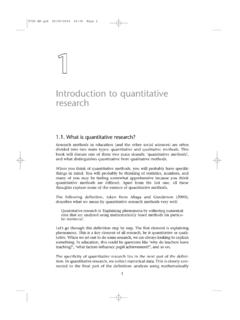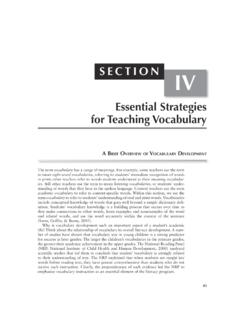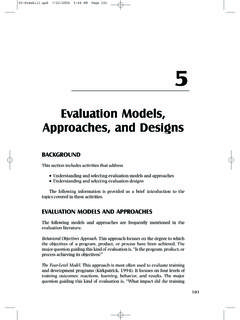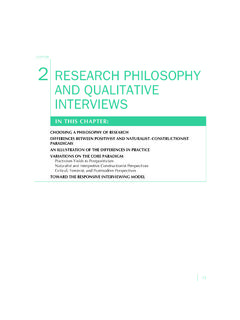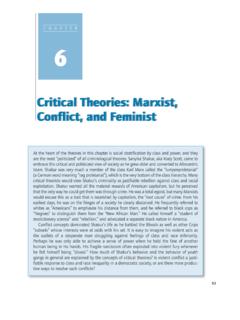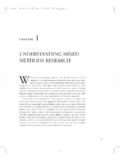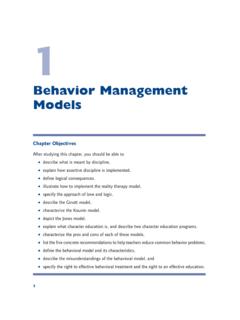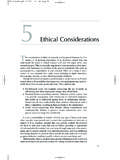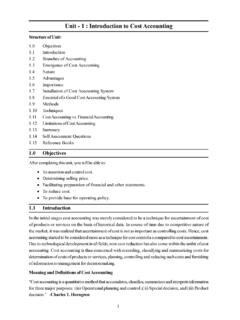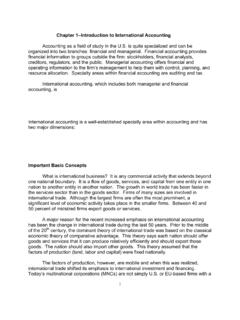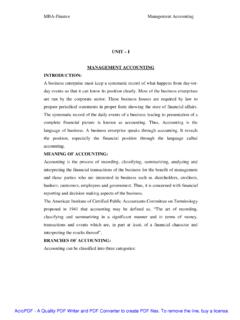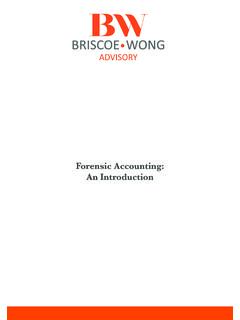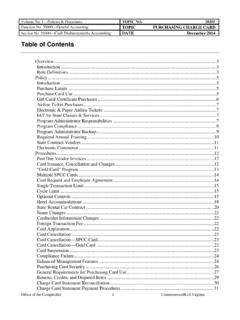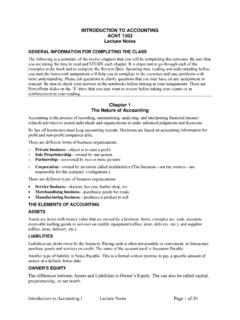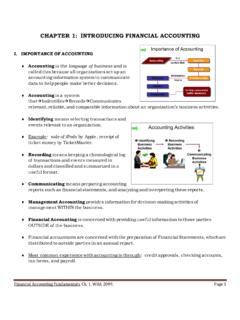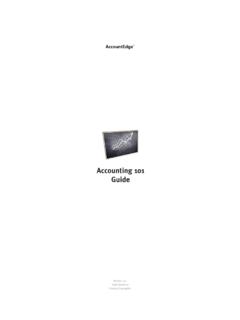Transcription of An Introduction to Accounting Theory - SAGE …
1 1An Introduction to Accounting TheoryLearning ObjectivesAfter reading this chapter, you should be able to: Understand the meaning of Accounting Theory and why it is an important topic. Understand the relationship between Accounting Theory and policy making. Understand what measurement is and its role in Accounting . Gain insight into the principal valuation systems in Accounting has not been called the dismal science, it is frequently viewed asa dry, cold, and highly analytical discipline with very precise answers that are eithercorrect or incorrect.
2 Nothing could be further from the truth. To take a simple example, assumethat two enterprises that are otherwise similar are valuing their inventory and cost of goodssold using different Accounting methods. Firm A selects LIFO and Firm B selects FIFO, givingtotally different but equally correct , one might say that a choice among inventory methods is merely an accountingconstruct : The type of games accountants play that are of interest to them but have noth-ing to do with the real world. Once again this would be totally incorrect.
3 The LIFO versusFIFO argument has important income tax ramifications, resulting under LIFO in a morerapid write-off of current inventory costs against revenues (assuming rising inventory prices),which generally means lower income taxes. Thus an Accounting construct has an important social reality : how much income tax is 10/17/2007 7:09 PM Page 1 Income tax payments are not the only social reality that Accounting numbers affect. Hereare some other examples:1. Income numbers can be instrumental in evaluating the performance of management, whichcan affect salaries and bonuses and even whether individual management members will retaintheir Income numbers and various balance sheet ratios can affect dividend Income numbers and balance sheet ratios can affect the firm s credit standing and, therefore.
4 Thecost of Different income numbers might affect the price of the firm s stock if the stock is publicly tradedand the market cannot see through the Accounting methods that have been it is the case that Accounting numbers have important social consequences, why is itthe case that we cannot always measure economic reality accurately? Different perceptionsexist of economic reality. For example, we may say on the one hand that the value of an assetmay be equal to the amount paid for it in markets in which the asset would ordinarily beacquired, or, on the other hand, some may see an asset s value represented by the amount thefirm could acquire by selling the asset.
5 These two values are not the same. The former valueis called replacement cost or entry value, and the latter is called exit value (these are not the onlypossible value choices). Both values are discussed in the appendix to this chapter and inChapter 14. Exit values are usually lower than entry values because the owning enterprisedoes not generally have the same access to buyers as firms that regularly sell the assetthrough ordinary channels. Hence, there is a valuation choice between exit and entry , however, that we take the position that both of these valuations have merit but theyare not easy to measure because market quotations may not be available and users may notunderstand what these valuations mean.
6 Hence, a third choice may arise: historical entry and exit values represent some form of economic reality, the unreliability of themeasurements may lead some people to opt for historical cost on the grounds that usersunderstand it better than the other two approaches and measurement of the historical costnumber may be more question we have just been examining, the choice among Accounting values includinghistorical cost, falls within the realm of Accounting Theory . There are, however, other issuesthat arise in this example, both implicit and explicit:1.
7 For what purposes do users need the numbers ( , evaluating management s performance, eval-uating various aspects of the firm s credit standing, or even using the Accounting numbers as aninput for predicting how well the enterprise will do in the future)?22. How costly might it be to generate the desired measurement?The choice among the different types of values, as well as the related issues, falls withinthe domain of Accounting Theory . The term Accounting theoryis actually quite are many definitions throughout the Accounting literature of this somewhat elusiveterm.
8 Accounting Theory is defined here as the basic assumptions, definitions, principles, andconcepts and how we derive them that underlie Accounting rule making by a legislative2 Accounting 10/17/2007 7:09 PM Page 2body. Accounting Theory also includes the reporting of Accounting and financial has been and will continue to be extensive discussion and argumentation as to whatthese basic assumptions, definitions, principles, and concepts should be; thus, accountingtheory is never a final and finished product. Dialogue always continues, particularly as newissues and problems arise.
9 As the term is used here, it applies to financial Accounting and notto managerial or governmental Accounting . Financial Accounting refers to Accounting informa-tion that is used by investors, creditors, and other outside parties for analyzing managementperformance and decision-making interpret the definition of Accounting Theory broadly. Clearly, the drafting of a conceptualframework that is supposed to provide underlying guidance for the making of accountingrules falls within the coverage of Accounting Theory .
10 Analyzing Accounting rules to see howthey conform to a conceptual framework or other guiding principles likewise falls within theaccounting Theory realm. While the actual practice of Accounting is generally of less theoreticalinterest, questions such as why firms choose particular methods when choice exists (the LIFO versus FIFO question, for example) are of theoretical interest because we would like to knowthe reasons underlying the choice. In a pragmatic sense, one can say that Accounting Theory isconcerned with improving financial Accounting and statement presentation, although conflictmay exist between managers and investors, among other groups, relative to the issue of whatimproves financial statements, because their interests are not exactly the can also examine the types of topics, issues, and approaches discussed as part ofaccounting Theory .
